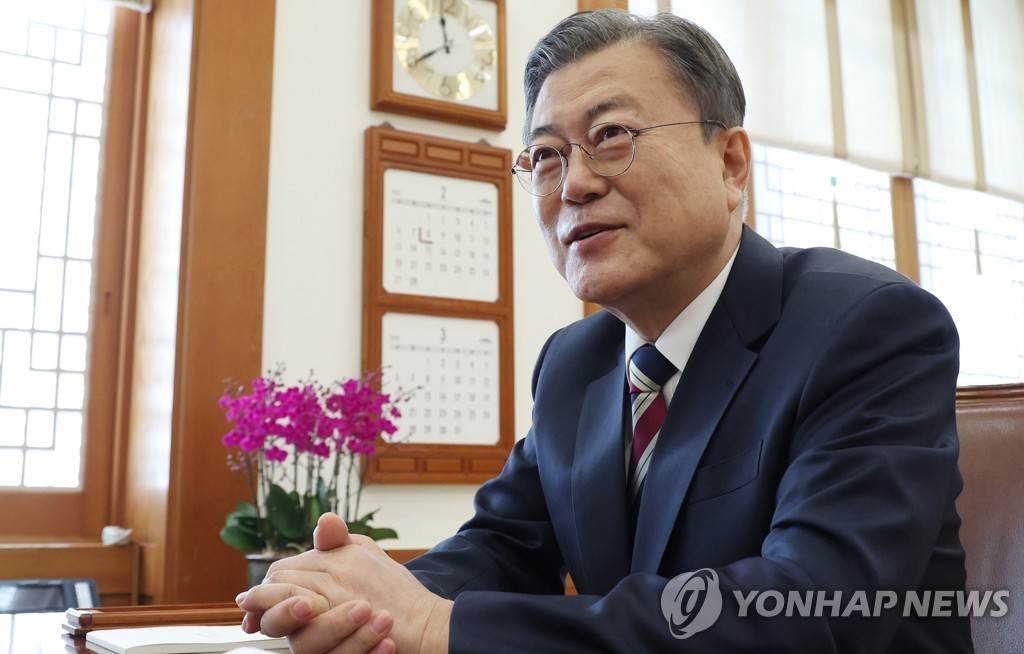ID :
621715
Thu, 02/10/2022 - 07:48
Auther :
Shortlink :
http://m.oananews.org//node/621715
The shortlink copeid
(News Focus) Moon keeps steady hand on two-track approach to Japan despite historical spat

SEOUL, Feb. 10 (Yonhap) -- Despite a fresh historical spat with Japan, President Moon Jae-in is keeping a steady hand on his two-pronged approach to Tokyo marked by toughness on colonial-era issues and flexibility on practical cooperation.
In a recent written interview with Yonhap News Agency and seven other news wire services, Moon cast Japan's push for the UNESCO heritage designation of a mine linked to wartime forced labor as "unnerving," but held out hopes for cooperation on "future tasks."
Moon's remarks came as the administration of U.S. President Joe Biden has been striving to knit back regional alliances to confront an intransigent North Korea and an assertive China.
"This is unnerving at a time when we should be resolving issues linked to our history and seeking to develop future-oriented relations," Moon said in his first public comment on Japan's drive to list the mine on Sado Island associated with Korean forced laborers as UNESCO heritage.
Moon added, "Korea and Japan are the closest of neighboring countries that must work together not only for bilateral relations but also for peace and prosperity in Northeast Asia and the world."
Diplomatic tensions between Seoul and Tokyo have run deep since 2019 when Japan imposed a set of export restrictions against South Korea in a move seen as economic retaliation for South Korean court rulings against Japanese firms involved in forced labor during Japan's 1910-45 colonial rule.
Tokyo's ongoing heritage bid added to a litany of thorny issues between the two countries, including Japan's claims to Korea's easternmost islets of Dokdo, its wartime sexual slavery and its planned discharge of tainted nuclear plant water into the ocean.
The latest tussle over the Sado mine -- where as many as 2,000 Koreans were thought to have been mobilized to work against their will -- struck a particularly jarring note as it put a damper on Seoul's hitherto unfruitful fence-mending efforts with Tokyo.
Japan has claimed that all colonial-era issues were settled with the 1965 treaty that normalized bilateral ties. Since taking office in October, Prime Minister Fumio Kishida has repeated Tokyo's mantra: Seoul should first contrive "acceptable" solutions to resolve the matter.
In the interview, Moon reaffirmed his openness to "any proposals" to resolve the historical issue "through dialogue," while underlining the need for Japan to show a "sincere attitude and mindset toward history."
"In order to resolve this problem, a solution must be acceptable to victims, which is also an established principle in the international community," he said.
But his remarks appeared to have focused evenly on the need for future cooperation with Japan.
"There is a growing need to strengthen cooperation between Korea and Japan to deal with future tasks," he said. "Our position remains unchanged: We are always open to communication with the Japanese prime minister."
The two-track approach has proved to be easier said than done. Affected by deep-seated historical antagonism as well as political and other variables, the approach has made little headway.
However, the North's recent series of missile launches, including those capable of striking Japan, have led to a growing sense that Seoul, Washington and Tokyo should put up a united front against Pyongyang's military adventurism.
Still, skepticism lingers over the prospects of a turnaround in relations between Seoul and Tokyo, as political events like South Korea's March presidential vote and Japan's upper house parliamentary election in July could get in the way.
Kishida, a former foreign minister seen as a relatively moderate, acknowledged the need for patching up ties with Seoul to counter the North's security threats along with the U.S., but his Cabinet plowed ahead with the heritage push amid mounting pressure from his conservative party's hard-liners.
Observers said the Biden administration could play a role in putting its two Asian allies on course toward reconciliation and cooperation on areas of mutual interests, such as security, supply chain and climate change.
"The Biden administration has focused on its diplomatic capital in strengthening the cooperation with South Korea and Japan and improving Seoul-Tokyo relations, which have worsened during the former Trump administration," Jo Yang-hyeon, a professor of the state-run Korea National Diplomatic Academy, said.
"It is to be seen how Biden's diplomacy can affect the relations between South Korea and Japan in times of political transition in both countries," he said.
South Korea, the U.S. and Japan are set to hold three-way foreign ministerial talks in Hawaii over the weekend to discuss joint efforts to defuse tension on the peninsula. Eyes are on whether they could put up a united front amid historical tensions between Seoul and Tokyo.
Consultations have been under way to arrange a bilateral meeting with Seoul and Tokyo on the occasion, but it has not been confirmed yet, according to informed sources.
ejkim@yna.co.kr
(END)





